- Udemy Deep Learning Course Introduction
- 1.Deep Learning A-Z™: Neural Networks, AI & ChatGPT by Udemy
- 2.A deep understanding of deep learning (with Python intro) by Udemy
- 3.Deep Learning: GANs and Variational Autoencoders by Udemy
- 4.PyTorch for Deep Learning : Zero to Mastery by Udemy
- 5.Unsupervised Deep Learning in Python by Udemy
- 6.Deep Learning Prerequisites: The Numpy Stack in Python V2 by Udemy (Free)
- 7.Basics of Deep Learning by Udemy (Free)
Udemy Deep Learning Course Introduction
Deep learning courses give instruction in preparing artificial neural networks with different layers. Pick up hands-on involvement in computer vision, common language processing, and more. Appropriate for students and experts, these courses offer sought-after abilities for AI careers. Remain at the cutting edge of development and investigate the potential of deep learning.
1.Deep Learning A-Z™: Neural Networks, AI & ChatGPT by Udemy
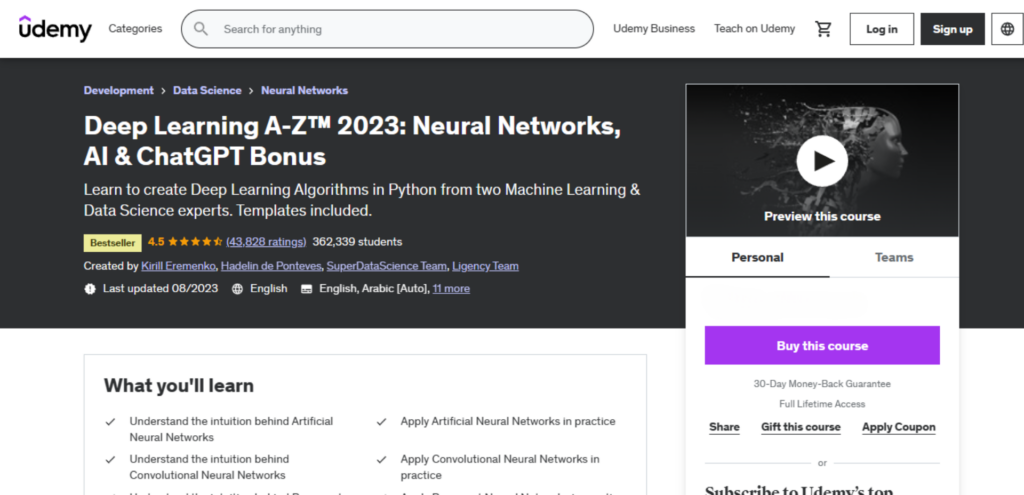
This Python-focused Deep Learning course, led by Hadelin de Ponteves and Kirill Eremenko, provides participants with skills in Artificial Neural Networks, Convolutional Neural Networks, and Recurrent Neural Networks, as well as practical templates. Ideal for Deep Learning enthusiasts such as students, data analysts, business owners, and entrepreneurs who want to learn these cutting-edge principles and applications in Machine Learning and Data Science.
Deep Learning A-Z™: Neural Networks, AI & ChatGPT
Click Here to Know more and Register to this course
2.A deep understanding of deep learning (with Python intro) by Udemy
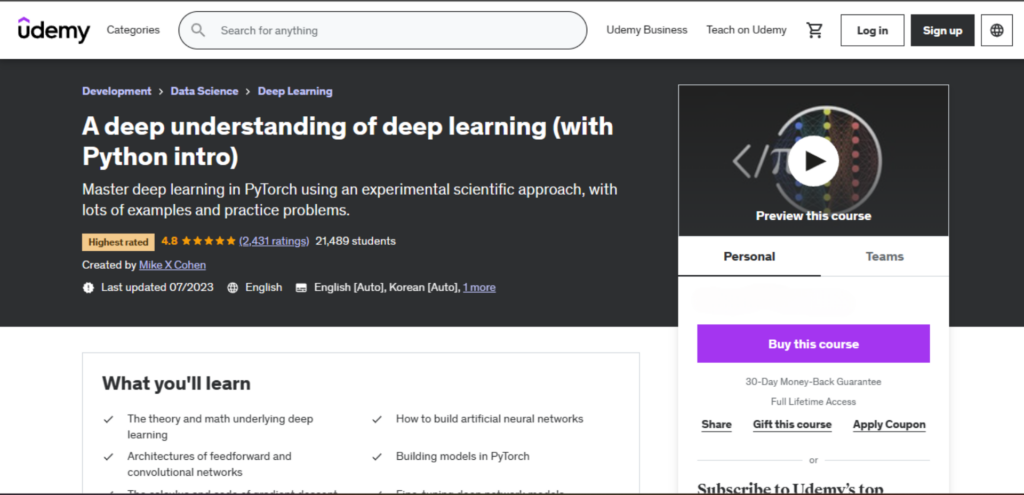
Mike X Cohen’s PyTorch-centered course takes an experimental scientific approach to mastering deep learning, complete with numerous examples and practice problems. Participants will learn all there is to know about deep learning, from the fundamental concepts and math underlying it to building artificial neural networks and studying feedforward and convolutional network topologies in PyTorch. Slope descent mathematics and code, fine-tuning deep network models, autoencoders, transfer learning, regularization approaches, weight initializations, image convolution using predefined and learnt kernels, and the transparency of deep learning models are all covered in the program.
A deep understanding of deep learning
Click Here to Know more and Register to this course
3.Deep Learning: GANs and Variational Autoencoders by Udemy
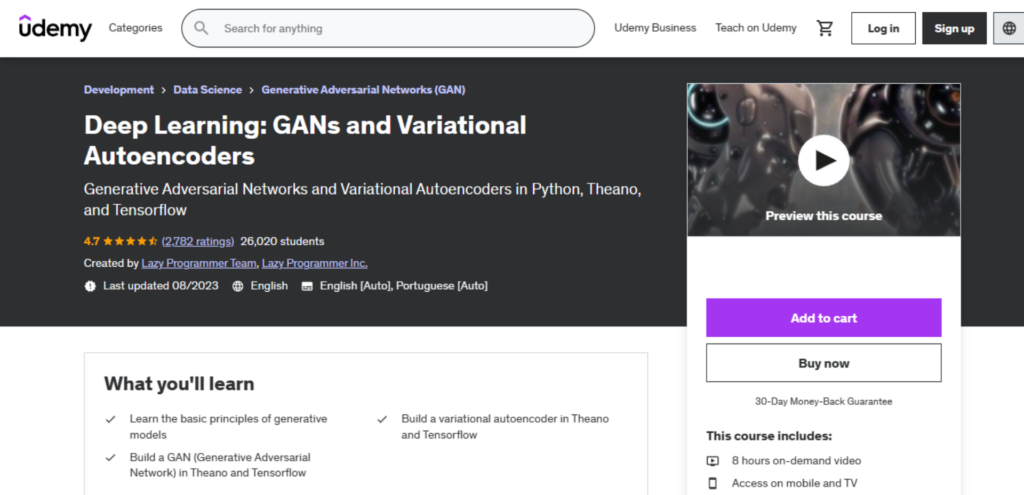
This course, developed by the Lazy Programmer Team, digs into Generative Adversarial Networks (GANs) and Variational Autoencoders with Python, Theano, and Tensorflow. Participants will understand the fundamental principles of generative models and receive hands-on experience building a variational autoencoder in both Theano and Tensorflow, as well as a GAN (Generative Adversarial Network) in the same frameworks. This Udemy course is designed for anyone who wants to improve their grasp of deep learning. It is open to everyone who wants to advance their knowledge in this dynamic topic.
Deep Learning: GANs and Variational Autoencoders
Click Here to Know more and Register to this course
4.PyTorch for Deep Learning : Zero to Mastery by Udemy
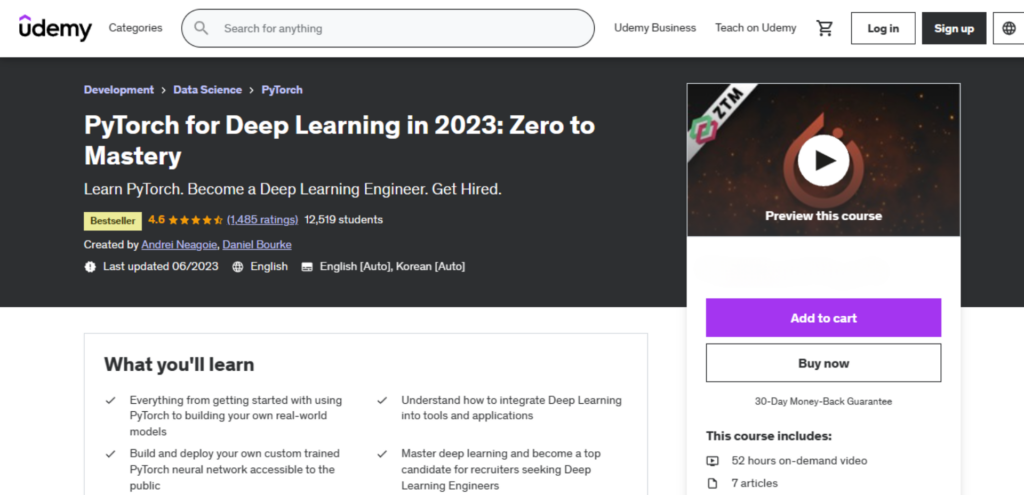
This course, led by Andrei Neagoie and Daniel Bourke, focuses on PyTorch—a tool for Deep Learning. It’s designed to help people become skilled Deep Learning Engineers, ready for good job opportunities. By finishing the course, you’ll become an expert in PyTorch, learning everything from the basics to creating real-world models and sharing your custom-trained PyTorch setups with the public. The course is great for making Deep Learning practical, showing how to use it in real tools and applications. It teaches PyTorch as a fantastic starting point for machine learning, guiding you through building and using machine learning programs in Python.
PyTorch for Deep Learning: Zero to Mastery
Click Here to Know more and Register to this course.
5.Unsupervised Deep Learning in Python by Udemy
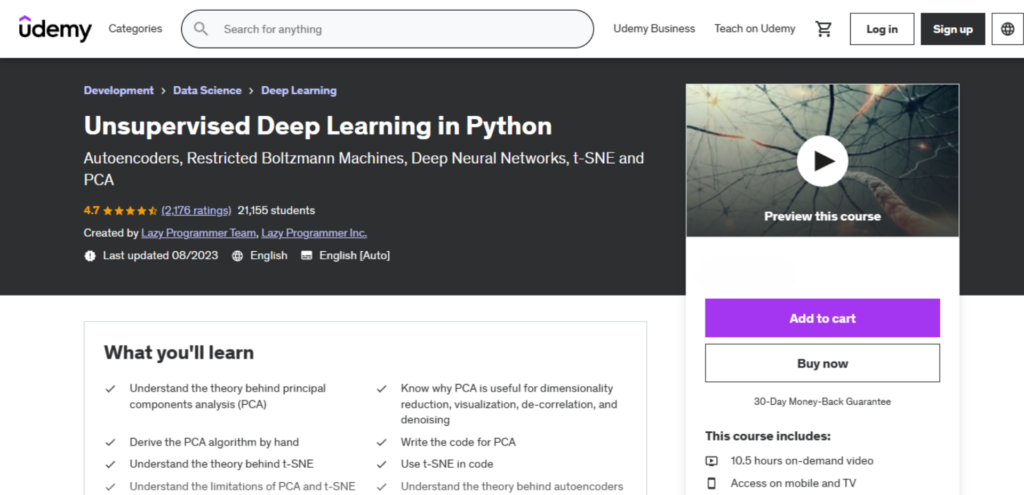
Lazy Programmer Inc. brings a course focusing on Autoencoders, Restricted Boltzmann Machines, Deep Neural Networks, t-SNE, and PCA. Completing this course equips participants to comprehend PCA’s theory and utility, derive its algorithm, and code it. Additionally, it covers t-SNE theory, usage in code, limitations, autoencoders, stacked autoencoders, RBMs, and their training complexities with code examples in Theano and TensorFlow. Ideal for students and professionals aiming to bolster their deep learning skills and grasp modern developments in the field.
Unsupervised Deep Learning in Python
Click Here to Know more and Register to this course
6.Deep Learning Prerequisites: The Numpy Stack in Python V2 by Udemy (Free)
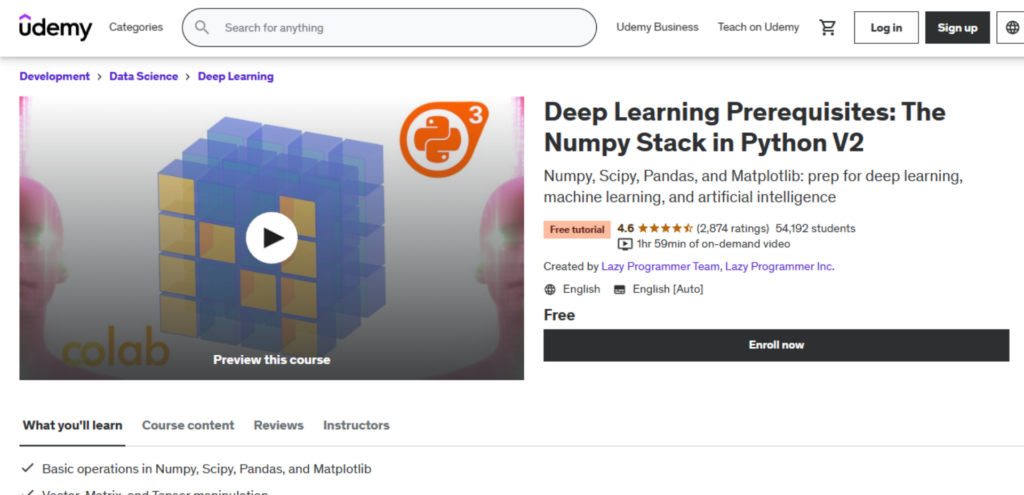
The Lazy Programmer Team’s course covers essential Numpy, Scipy, Pandas, and Matplotlib operations, ideal for those preparing for deep learning and machine learning. It’s tailored for anyone seeking to implement Machine Learning algorithms, focusing on data manipulation, visualization, and DataFrame handling.
Deep Learning Prerequisites: The Numpy Stack in Python V2
Click Here to Know more and Register to this course
7.Basics of Deep Learning by Udemy (Free)
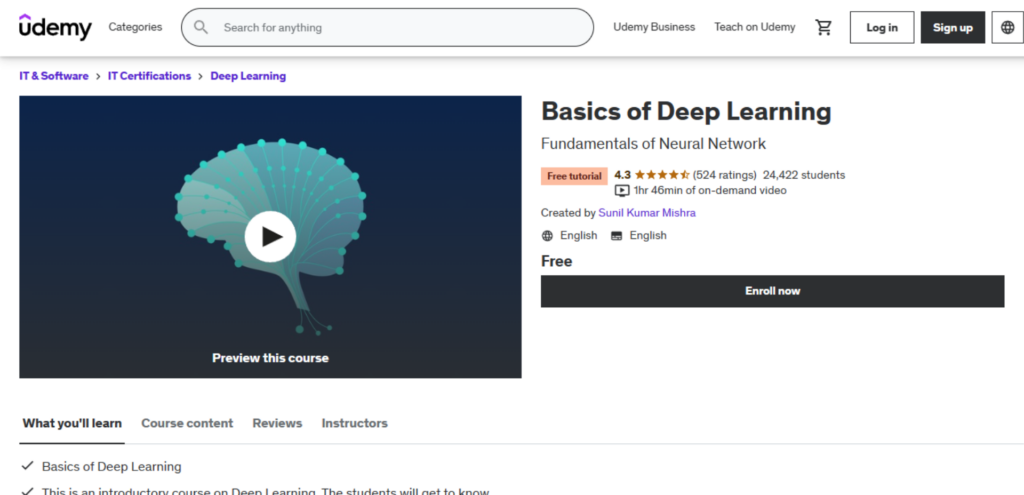
Sunil Kumar Mishra presents an introductory course on Deep Learning, focusing on the fundamentals of Neural Networks. This course offers insights into the evolution and practical applications of deep neural networks in domains such as image recognition and natural language processing. It caters to developers, business managers, functional leads, and AI enthusiasts seeking foundational knowledge in Deep Learning.
Basics of Deep Learning
Click Here to Know more and Register to this course
FAQ’s
1.What is deep learning?
Deep learning is a subset of machine learning that centers on preparing artificial neural networks with numerous layers to learn and make forecasts or choices on complex data.
2.How is deep learning different from traditional machine learning?
Deep learning employs artificial neural networks with numerous layers, empowering it to learn and extricate progressive representations from information. Traditional machine learning procedures frequently depend on manually built features.
3.What are some common applications of deep learning?
Deep learning has diverse applications, including image and speech recognition, natural language processing, autonomous vehicles, recommendation systems, and healthcare diagnostics.
4.Are deep learning courses accessible online?
Yes, there are different online stages and instructive teaching that offer deep learning courses in both self-paced and instructor-led designs. These courses give adaptability for learners to ponder at their claim pace.
5.What is the future of deep learning?
Deep learning is anticipated to proceed progressing quickly and discover applications in unused spaces. It’ll likely play a pivotal part in driving developments in areas such as healthcare, independent frameworks, back, and logical research.